An Examination of Motivation and Hygiene Factors in a Company Setting
VerifiedAdded on 2021/08/20
|11
|2907
|66
Report
AI Summary
This report delves into the crucial elements of employee motivation and hygiene factors within a company. It examines the effects of motivation factors such as job recognition, achievement, growth, responsibility, and the work itself, highlighting their positive impact on job satisfaction and productivity. Conversely, the report notes the absence of these factors does not necessarily lead to dissatisfaction. The analysis then explores hygiene factors, including salary, interpersonal relationships, working conditions, supervision, and job security, and their influence on job dissatisfaction when absent. The report provides real-world implications, discussing issues like unrealistic targets, lack of training, poor working conditions, and inadequate supervision. Furthermore, it suggests improvements such as refining the physical working environment, offering sufficient personal space, and fostering trust and perks to enhance job security and recognition, ultimately aiming to boost employee morale and reduce turnover rates. The report emphasizes the importance of a supportive and motivating workplace to enhance employee performance and retention.

Paraphrase This Document
Need a fresh take? Get an instant paraphrase of this document with our AI Paraphraser

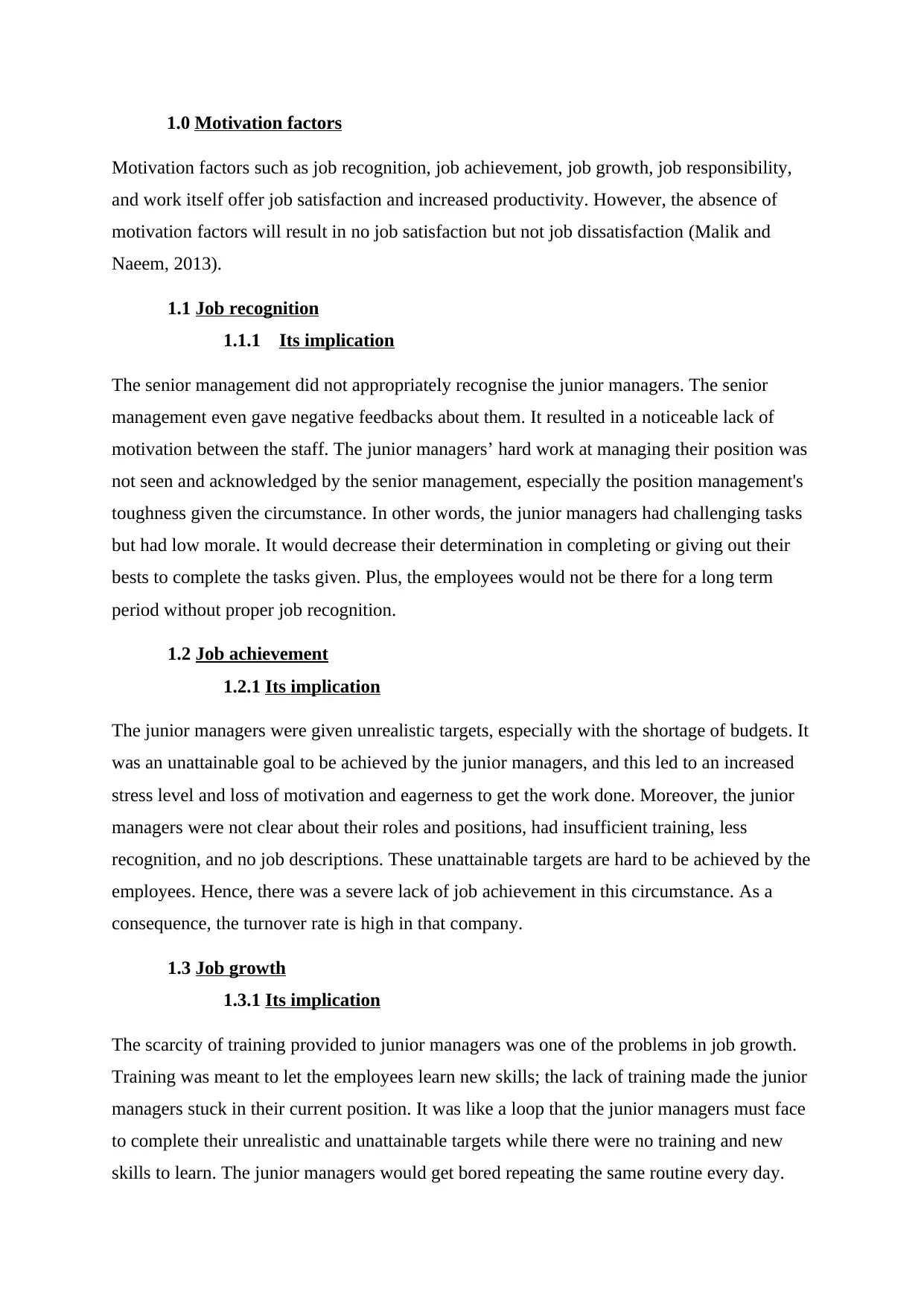
1.0 Motivation factors
Motivation factors such as job recognition, job achievement, job growth, job responsibility,
and work itself offer job satisfaction and increased productivity. However, the absence of
motivation factors will result in no job satisfaction but not job dissatisfaction (Malik and
Naeem, 2013).
1.1 Job recognition
1.1.1 Its implication
The senior management did not appropriately recognise the junior managers. The senior
management even gave negative feedbacks about them. It resulted in a noticeable lack of
motivation between the staff. The junior managers’ hard work at managing their position was
not seen and acknowledged by the senior management, especially the position management's
toughness given the circumstance. In other words, the junior managers had challenging tasks
but had low morale. It would decrease their determination in completing or giving out their
bests to complete the tasks given. Plus, the employees would not be there for a long term
period without proper job recognition.
1.2 Job achievement
1.2.1 Its implication
The junior managers were given unrealistic targets, especially with the shortage of budgets. It
was an unattainable goal to be achieved by the junior managers, and this led to an increased
stress level and loss of motivation and eagerness to get the work done. Moreover, the junior
managers were not clear about their roles and positions, had insufficient training, less
recognition, and no job descriptions. These unattainable targets are hard to be achieved by the
employees. Hence, there was a severe lack of job achievement in this circumstance. As a
consequence, the turnover rate is high in that company.
1.3 Job growth
1.3.1 Its implication
The scarcity of training provided to junior managers was one of the problems in job growth.
Training was meant to let the employees learn new skills; the lack of training made the junior
managers stuck in their current position. It was like a loop that the junior managers must face
to complete their unrealistic and unattainable targets while there were no training and new
skills to learn. The junior managers would get bored repeating the same routine every day.
Motivation factors such as job recognition, job achievement, job growth, job responsibility,
and work itself offer job satisfaction and increased productivity. However, the absence of
motivation factors will result in no job satisfaction but not job dissatisfaction (Malik and
Naeem, 2013).
1.1 Job recognition
1.1.1 Its implication
The senior management did not appropriately recognise the junior managers. The senior
management even gave negative feedbacks about them. It resulted in a noticeable lack of
motivation between the staff. The junior managers’ hard work at managing their position was
not seen and acknowledged by the senior management, especially the position management's
toughness given the circumstance. In other words, the junior managers had challenging tasks
but had low morale. It would decrease their determination in completing or giving out their
bests to complete the tasks given. Plus, the employees would not be there for a long term
period without proper job recognition.
1.2 Job achievement
1.2.1 Its implication
The junior managers were given unrealistic targets, especially with the shortage of budgets. It
was an unattainable goal to be achieved by the junior managers, and this led to an increased
stress level and loss of motivation and eagerness to get the work done. Moreover, the junior
managers were not clear about their roles and positions, had insufficient training, less
recognition, and no job descriptions. These unattainable targets are hard to be achieved by the
employees. Hence, there was a severe lack of job achievement in this circumstance. As a
consequence, the turnover rate is high in that company.
1.3 Job growth
1.3.1 Its implication
The scarcity of training provided to junior managers was one of the problems in job growth.
Training was meant to let the employees learn new skills; the lack of training made the junior
managers stuck in their current position. It was like a loop that the junior managers must face
to complete their unrealistic and unattainable targets while there were no training and new
skills to learn. The junior managers would get bored repeating the same routine every day.
⊘ This is a preview!⊘
Do you want full access?
Subscribe today to unlock all pages.

Trusted by 1+ million students worldwide
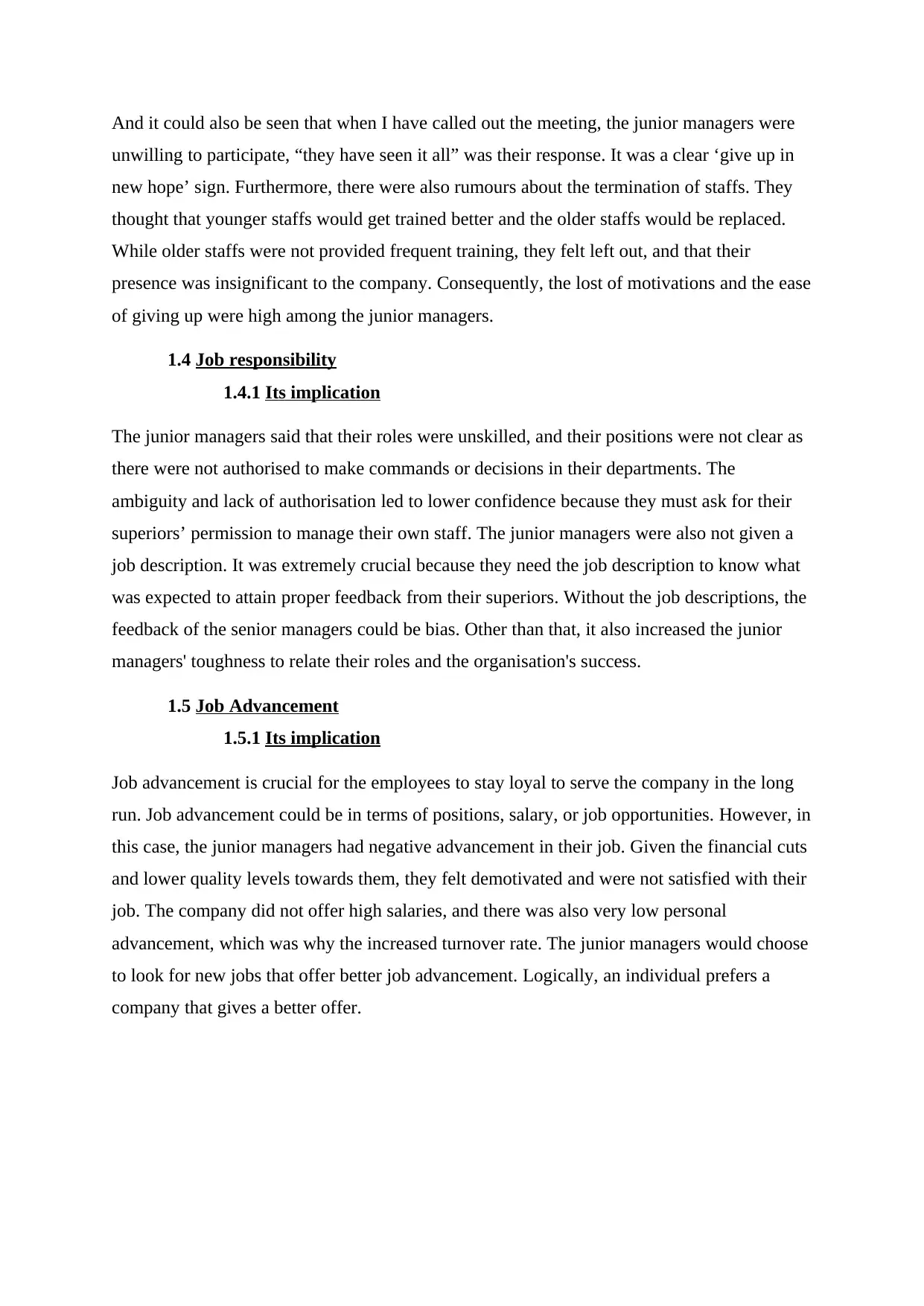
And it could also be seen that when I have called out the meeting, the junior managers were
unwilling to participate, “they have seen it all” was their response. It was a clear ‘give up in
new hope’ sign. Furthermore, there were also rumours about the termination of staffs. They
thought that younger staffs would get trained better and the older staffs would be replaced.
While older staffs were not provided frequent training, they felt left out, and that their
presence was insignificant to the company. Consequently, the lost of motivations and the ease
of giving up were high among the junior managers.
1.4 Job responsibility
1.4.1 Its implication
The junior managers said that their roles were unskilled, and their positions were not clear as
there were not authorised to make commands or decisions in their departments. The
ambiguity and lack of authorisation led to lower confidence because they must ask for their
superiors’ permission to manage their own staff. The junior managers were also not given a
job description. It was extremely crucial because they need the job description to know what
was expected to attain proper feedback from their superiors. Without the job descriptions, the
feedback of the senior managers could be bias. Other than that, it also increased the junior
managers' toughness to relate their roles and the organisation's success.
1.5 Job Advancement
1.5.1 Its implication
Job advancement is crucial for the employees to stay loyal to serve the company in the long
run. Job advancement could be in terms of positions, salary, or job opportunities. However, in
this case, the junior managers had negative advancement in their job. Given the financial cuts
and lower quality levels towards them, they felt demotivated and were not satisfied with their
job. The company did not offer high salaries, and there was also very low personal
advancement, which was why the increased turnover rate. The junior managers would choose
to look for new jobs that offer better job advancement. Logically, an individual prefers a
company that gives a better offer.
unwilling to participate, “they have seen it all” was their response. It was a clear ‘give up in
new hope’ sign. Furthermore, there were also rumours about the termination of staffs. They
thought that younger staffs would get trained better and the older staffs would be replaced.
While older staffs were not provided frequent training, they felt left out, and that their
presence was insignificant to the company. Consequently, the lost of motivations and the ease
of giving up were high among the junior managers.
1.4 Job responsibility
1.4.1 Its implication
The junior managers said that their roles were unskilled, and their positions were not clear as
there were not authorised to make commands or decisions in their departments. The
ambiguity and lack of authorisation led to lower confidence because they must ask for their
superiors’ permission to manage their own staff. The junior managers were also not given a
job description. It was extremely crucial because they need the job description to know what
was expected to attain proper feedback from their superiors. Without the job descriptions, the
feedback of the senior managers could be bias. Other than that, it also increased the junior
managers' toughness to relate their roles and the organisation's success.
1.5 Job Advancement
1.5.1 Its implication
Job advancement is crucial for the employees to stay loyal to serve the company in the long
run. Job advancement could be in terms of positions, salary, or job opportunities. However, in
this case, the junior managers had negative advancement in their job. Given the financial cuts
and lower quality levels towards them, they felt demotivated and were not satisfied with their
job. The company did not offer high salaries, and there was also very low personal
advancement, which was why the increased turnover rate. The junior managers would choose
to look for new jobs that offer better job advancement. Logically, an individual prefers a
company that gives a better offer.
Paraphrase This Document
Need a fresh take? Get an instant paraphrase of this document with our AI Paraphraser
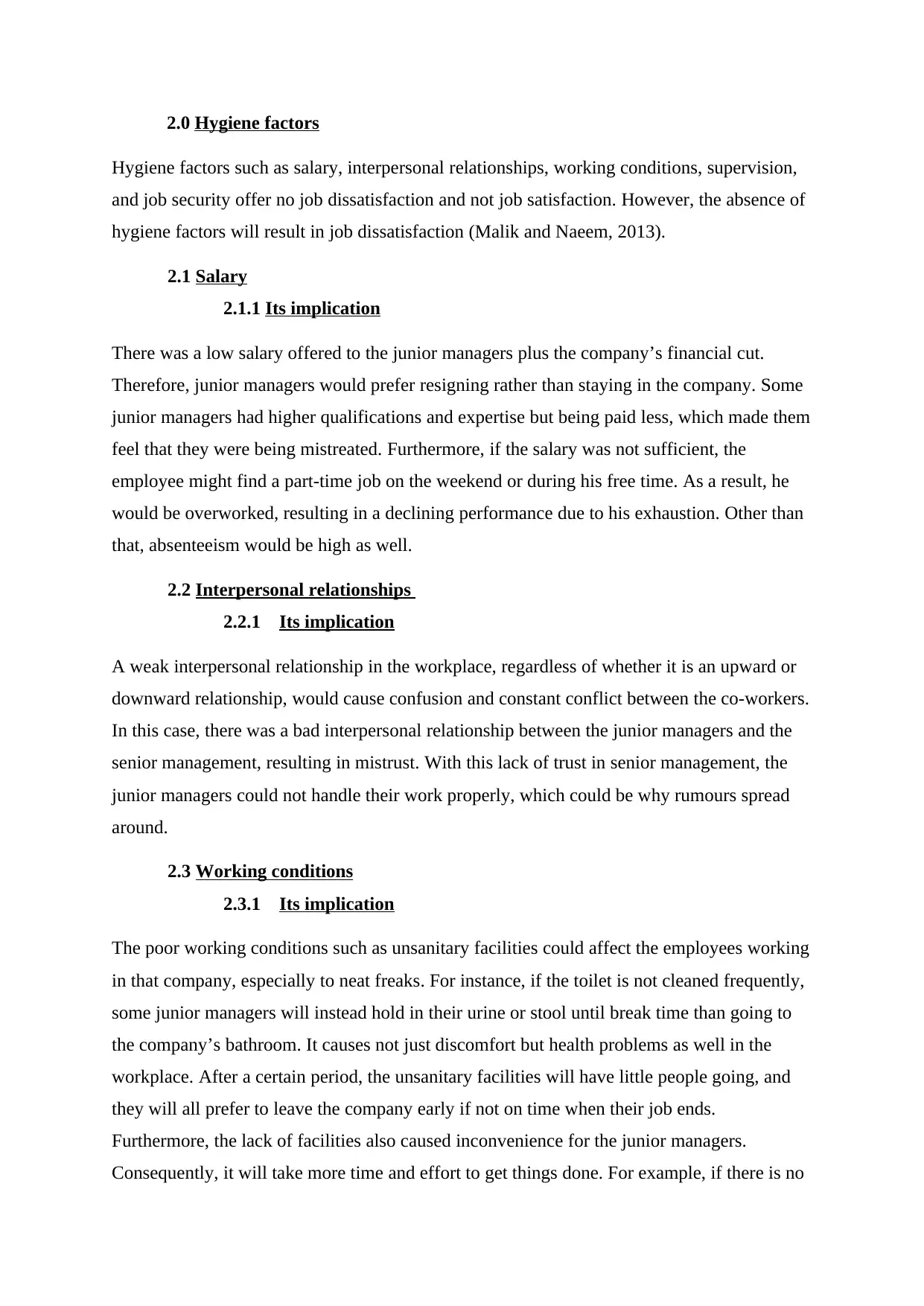
2.0 Hygiene factors
Hygiene factors such as salary, interpersonal relationships, working conditions, supervision,
and job security offer no job dissatisfaction and not job satisfaction. However, the absence of
hygiene factors will result in job dissatisfaction (Malik and Naeem, 2013).
2.1 Salary
2.1.1 Its implication
There was a low salary offered to the junior managers plus the company’s financial cut.
Therefore, junior managers would prefer resigning rather than staying in the company. Some
junior managers had higher qualifications and expertise but being paid less, which made them
feel that they were being mistreated. Furthermore, if the salary was not sufficient, the
employee might find a part-time job on the weekend or during his free time. As a result, he
would be overworked, resulting in a declining performance due to his exhaustion. Other than
that, absenteeism would be high as well.
2.2 Interpersonal relationships
2.2.1 Its implication
A weak interpersonal relationship in the workplace, regardless of whether it is an upward or
downward relationship, would cause confusion and constant conflict between the co-workers.
In this case, there was a bad interpersonal relationship between the junior managers and the
senior management, resulting in mistrust. With this lack of trust in senior management, the
junior managers could not handle their work properly, which could be why rumours spread
around.
2.3 Working conditions
2.3.1 Its implication
The poor working conditions such as unsanitary facilities could affect the employees working
in that company, especially to neat freaks. For instance, if the toilet is not cleaned frequently,
some junior managers will instead hold in their urine or stool until break time than going to
the company’s bathroom. It causes not just discomfort but health problems as well in the
workplace. After a certain period, the unsanitary facilities will have little people going, and
they will all prefer to leave the company early if not on time when their job ends.
Furthermore, the lack of facilities also caused inconvenience for the junior managers.
Consequently, it will take more time and effort to get things done. For example, if there is no
Hygiene factors such as salary, interpersonal relationships, working conditions, supervision,
and job security offer no job dissatisfaction and not job satisfaction. However, the absence of
hygiene factors will result in job dissatisfaction (Malik and Naeem, 2013).
2.1 Salary
2.1.1 Its implication
There was a low salary offered to the junior managers plus the company’s financial cut.
Therefore, junior managers would prefer resigning rather than staying in the company. Some
junior managers had higher qualifications and expertise but being paid less, which made them
feel that they were being mistreated. Furthermore, if the salary was not sufficient, the
employee might find a part-time job on the weekend or during his free time. As a result, he
would be overworked, resulting in a declining performance due to his exhaustion. Other than
that, absenteeism would be high as well.
2.2 Interpersonal relationships
2.2.1 Its implication
A weak interpersonal relationship in the workplace, regardless of whether it is an upward or
downward relationship, would cause confusion and constant conflict between the co-workers.
In this case, there was a bad interpersonal relationship between the junior managers and the
senior management, resulting in mistrust. With this lack of trust in senior management, the
junior managers could not handle their work properly, which could be why rumours spread
around.
2.3 Working conditions
2.3.1 Its implication
The poor working conditions such as unsanitary facilities could affect the employees working
in that company, especially to neat freaks. For instance, if the toilet is not cleaned frequently,
some junior managers will instead hold in their urine or stool until break time than going to
the company’s bathroom. It causes not just discomfort but health problems as well in the
workplace. After a certain period, the unsanitary facilities will have little people going, and
they will all prefer to leave the company early if not on time when their job ends.
Furthermore, the lack of facilities also caused inconvenience for the junior managers.
Consequently, it will take more time and effort to get things done. For example, if there is no
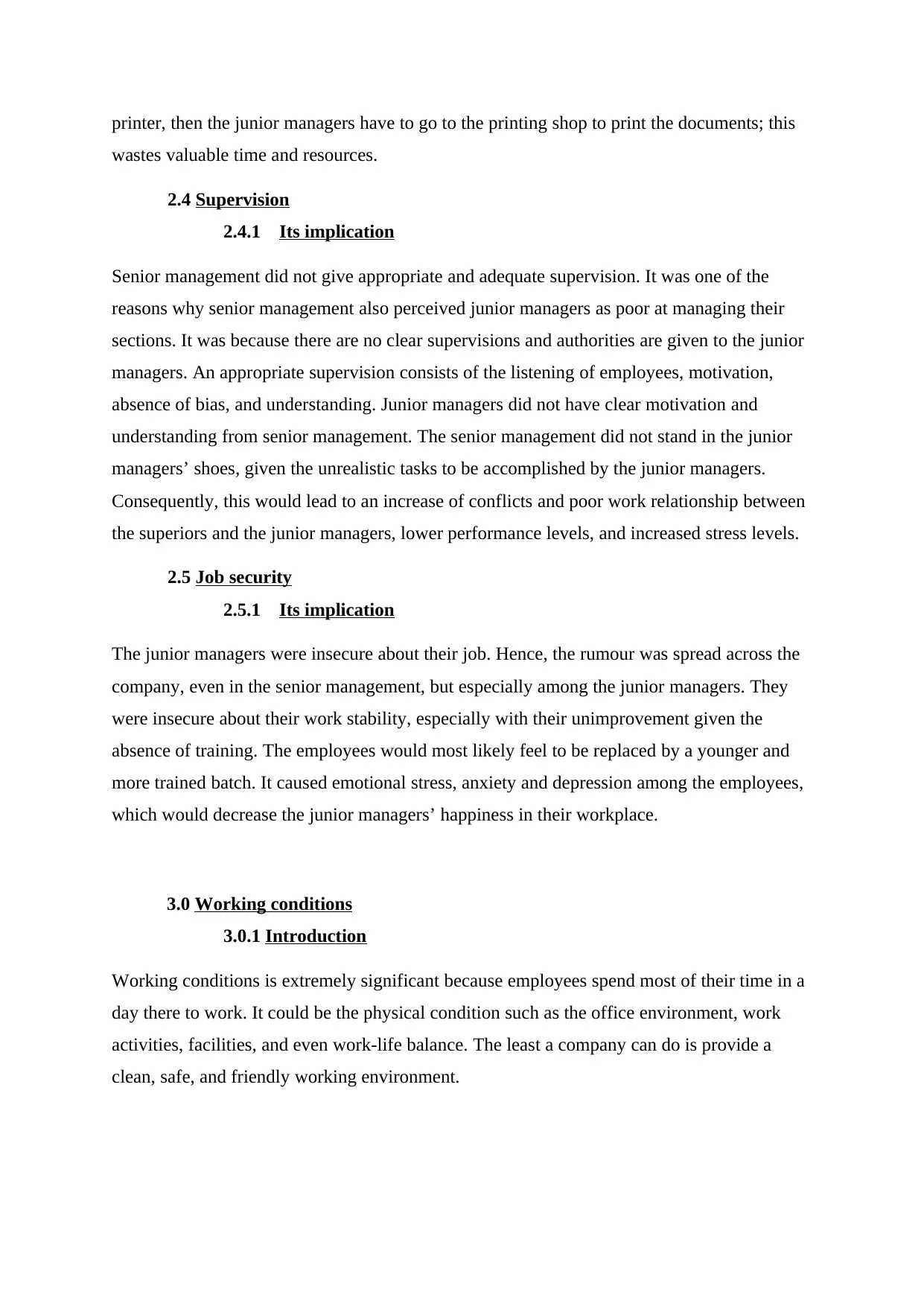
printer, then the junior managers have to go to the printing shop to print the documents; this
wastes valuable time and resources.
2.4 Supervision
2.4.1 Its implication
Senior management did not give appropriate and adequate supervision. It was one of the
reasons why senior management also perceived junior managers as poor at managing their
sections. It was because there are no clear supervisions and authorities are given to the junior
managers. An appropriate supervision consists of the listening of employees, motivation,
absence of bias, and understanding. Junior managers did not have clear motivation and
understanding from senior management. The senior management did not stand in the junior
managers’ shoes, given the unrealistic tasks to be accomplished by the junior managers.
Consequently, this would lead to an increase of conflicts and poor work relationship between
the superiors and the junior managers, lower performance levels, and increased stress levels.
2.5 Job security
2.5.1 Its implication
The junior managers were insecure about their job. Hence, the rumour was spread across the
company, even in the senior management, but especially among the junior managers. They
were insecure about their work stability, especially with their unimprovement given the
absence of training. The employees would most likely feel to be replaced by a younger and
more trained batch. It caused emotional stress, anxiety and depression among the employees,
which would decrease the junior managers’ happiness in their workplace.
3.0 Working conditions
3.0.1 Introduction
Working conditions is extremely significant because employees spend most of their time in a
day there to work. It could be the physical condition such as the office environment, work
activities, facilities, and even work-life balance. The least a company can do is provide a
clean, safe, and friendly working environment.
wastes valuable time and resources.
2.4 Supervision
2.4.1 Its implication
Senior management did not give appropriate and adequate supervision. It was one of the
reasons why senior management also perceived junior managers as poor at managing their
sections. It was because there are no clear supervisions and authorities are given to the junior
managers. An appropriate supervision consists of the listening of employees, motivation,
absence of bias, and understanding. Junior managers did not have clear motivation and
understanding from senior management. The senior management did not stand in the junior
managers’ shoes, given the unrealistic tasks to be accomplished by the junior managers.
Consequently, this would lead to an increase of conflicts and poor work relationship between
the superiors and the junior managers, lower performance levels, and increased stress levels.
2.5 Job security
2.5.1 Its implication
The junior managers were insecure about their job. Hence, the rumour was spread across the
company, even in the senior management, but especially among the junior managers. They
were insecure about their work stability, especially with their unimprovement given the
absence of training. The employees would most likely feel to be replaced by a younger and
more trained batch. It caused emotional stress, anxiety and depression among the employees,
which would decrease the junior managers’ happiness in their workplace.
3.0 Working conditions
3.0.1 Introduction
Working conditions is extremely significant because employees spend most of their time in a
day there to work. It could be the physical condition such as the office environment, work
activities, facilities, and even work-life balance. The least a company can do is provide a
clean, safe, and friendly working environment.
⊘ This is a preview!⊘
Do you want full access?
Subscribe today to unlock all pages.

Trusted by 1+ million students worldwide
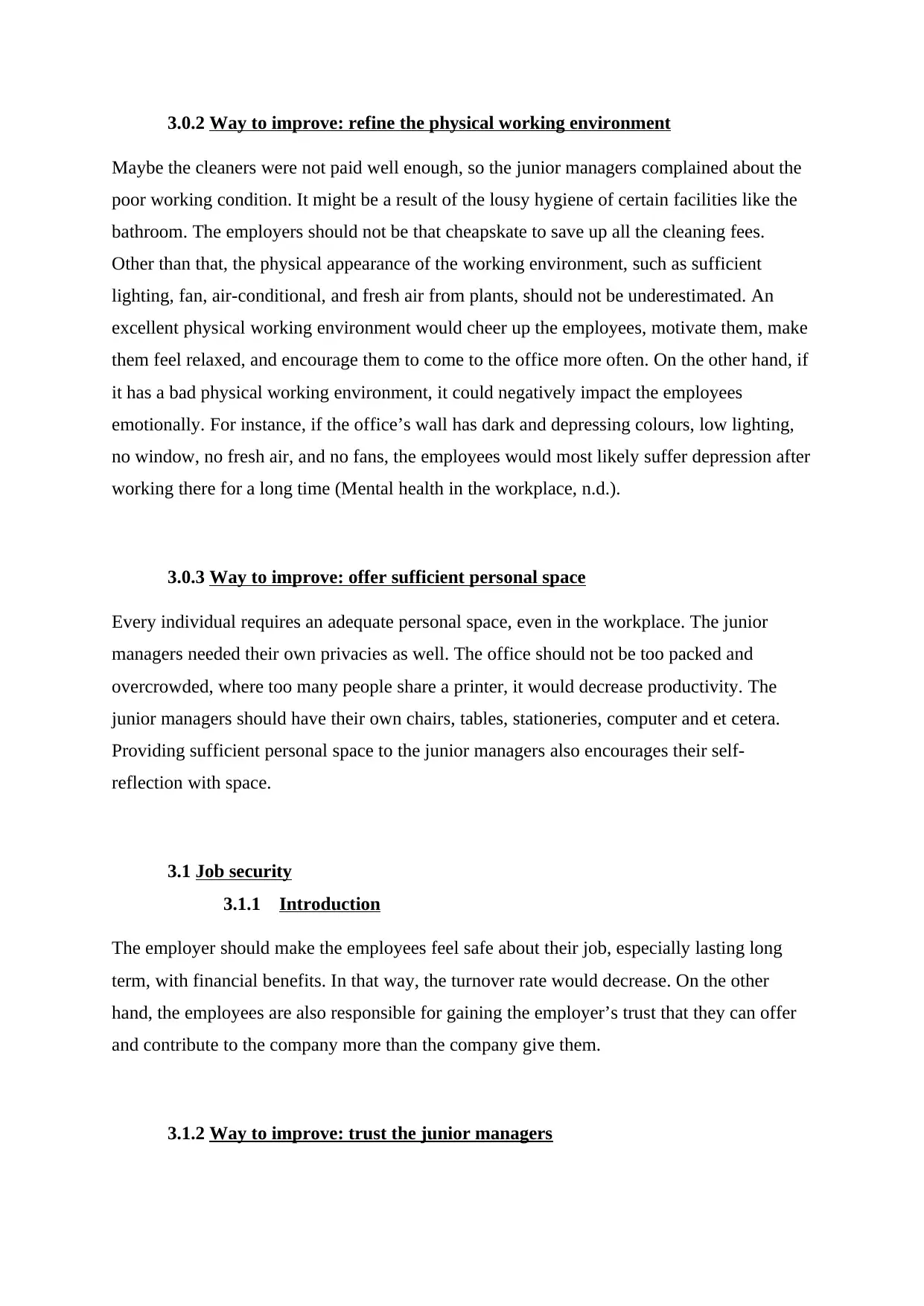
3.0.2 Way to improve: refine the physical working environment
Maybe the cleaners were not paid well enough, so the junior managers complained about the
poor working condition. It might be a result of the lousy hygiene of certain facilities like the
bathroom. The employers should not be that cheapskate to save up all the cleaning fees.
Other than that, the physical appearance of the working environment, such as sufficient
lighting, fan, air-conditional, and fresh air from plants, should not be underestimated. An
excellent physical working environment would cheer up the employees, motivate them, make
them feel relaxed, and encourage them to come to the office more often. On the other hand, if
it has a bad physical working environment, it could negatively impact the employees
emotionally. For instance, if the office’s wall has dark and depressing colours, low lighting,
no window, no fresh air, and no fans, the employees would most likely suffer depression after
working there for a long time (Mental health in the workplace, n.d.).
3.0.3 Way to improve: offer sufficient personal space
Every individual requires an adequate personal space, even in the workplace. The junior
managers needed their own privacies as well. The office should not be too packed and
overcrowded, where too many people share a printer, it would decrease productivity. The
junior managers should have their own chairs, tables, stationeries, computer and et cetera.
Providing sufficient personal space to the junior managers also encourages their self-
reflection with space.
3.1 Job security
3.1.1 Introduction
The employer should make the employees feel safe about their job, especially lasting long
term, with financial benefits. In that way, the turnover rate would decrease. On the other
hand, the employees are also responsible for gaining the employer’s trust that they can offer
and contribute to the company more than the company give them.
3.1.2 Way to improve: trust the junior managers
Maybe the cleaners were not paid well enough, so the junior managers complained about the
poor working condition. It might be a result of the lousy hygiene of certain facilities like the
bathroom. The employers should not be that cheapskate to save up all the cleaning fees.
Other than that, the physical appearance of the working environment, such as sufficient
lighting, fan, air-conditional, and fresh air from plants, should not be underestimated. An
excellent physical working environment would cheer up the employees, motivate them, make
them feel relaxed, and encourage them to come to the office more often. On the other hand, if
it has a bad physical working environment, it could negatively impact the employees
emotionally. For instance, if the office’s wall has dark and depressing colours, low lighting,
no window, no fresh air, and no fans, the employees would most likely suffer depression after
working there for a long time (Mental health in the workplace, n.d.).
3.0.3 Way to improve: offer sufficient personal space
Every individual requires an adequate personal space, even in the workplace. The junior
managers needed their own privacies as well. The office should not be too packed and
overcrowded, where too many people share a printer, it would decrease productivity. The
junior managers should have their own chairs, tables, stationeries, computer and et cetera.
Providing sufficient personal space to the junior managers also encourages their self-
reflection with space.
3.1 Job security
3.1.1 Introduction
The employer should make the employees feel safe about their job, especially lasting long
term, with financial benefits. In that way, the turnover rate would decrease. On the other
hand, the employees are also responsible for gaining the employer’s trust that they can offer
and contribute to the company more than the company give them.
3.1.2 Way to improve: trust the junior managers
Paraphrase This Document
Need a fresh take? Get an instant paraphrase of this document with our AI Paraphraser
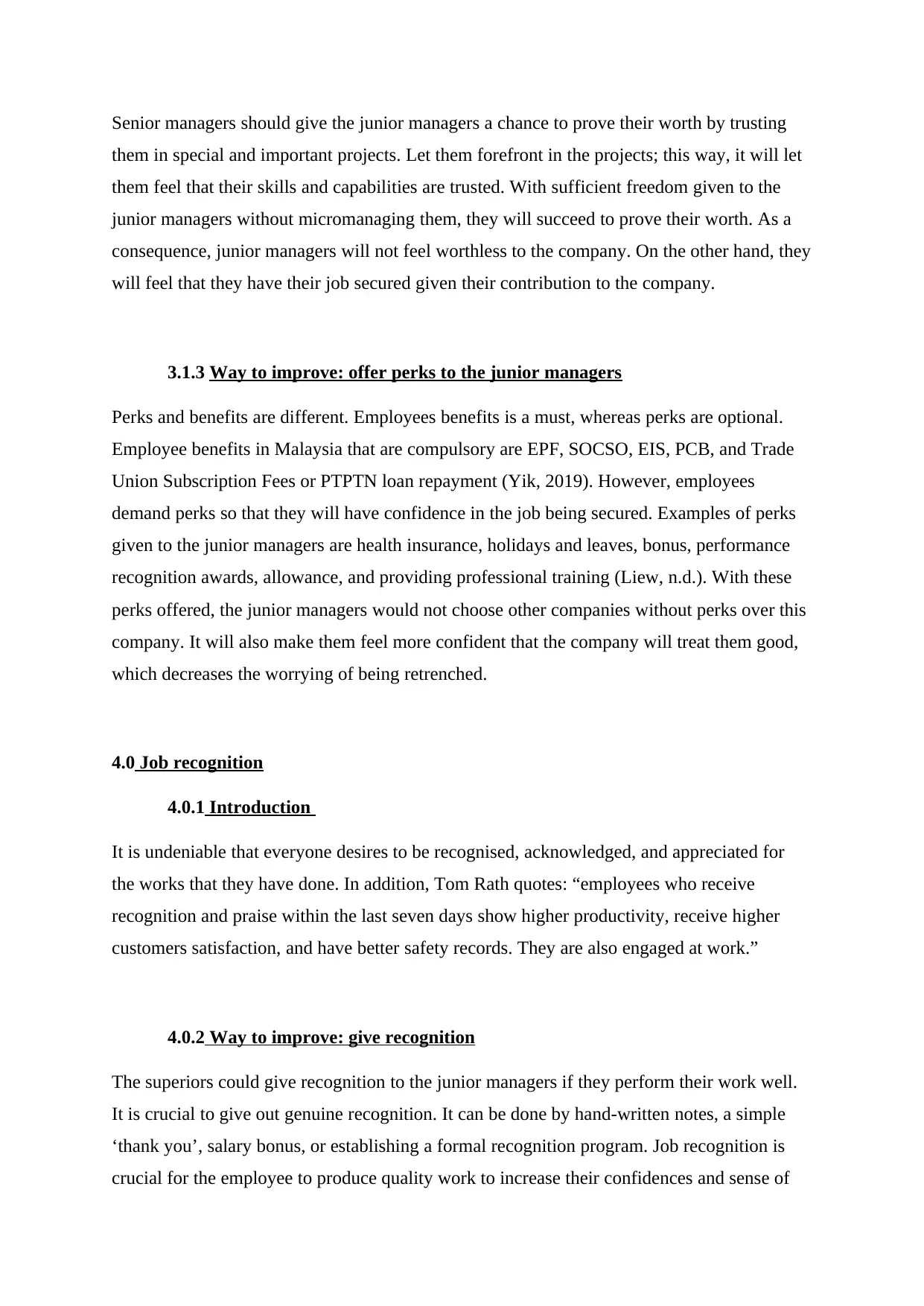
Senior managers should give the junior managers a chance to prove their worth by trusting
them in special and important projects. Let them forefront in the projects; this way, it will let
them feel that their skills and capabilities are trusted. With sufficient freedom given to the
junior managers without micromanaging them, they will succeed to prove their worth. As a
consequence, junior managers will not feel worthless to the company. On the other hand, they
will feel that they have their job secured given their contribution to the company.
3.1.3 Way to improve: offer perks to the junior managers
Perks and benefits are different. Employees benefits is a must, whereas perks are optional.
Employee benefits in Malaysia that are compulsory are EPF, SOCSO, EIS, PCB, and Trade
Union Subscription Fees or PTPTN loan repayment (Yik, 2019). However, employees
demand perks so that they will have confidence in the job being secured. Examples of perks
given to the junior managers are health insurance, holidays and leaves, bonus, performance
recognition awards, allowance, and providing professional training (Liew, n.d.). With these
perks offered, the junior managers would not choose other companies without perks over this
company. It will also make them feel more confident that the company will treat them good,
which decreases the worrying of being retrenched.
4.0 Job recognition
4.0.1 Introduction
It is undeniable that everyone desires to be recognised, acknowledged, and appreciated for
the works that they have done. In addition, Tom Rath quotes: “employees who receive
recognition and praise within the last seven days show higher productivity, receive higher
customers satisfaction, and have better safety records. They are also engaged at work.”
4.0.2 Way to improve: give recognition
The superiors could give recognition to the junior managers if they perform their work well.
It is crucial to give out genuine recognition. It can be done by hand-written notes, a simple
‘thank you’, salary bonus, or establishing a formal recognition program. Job recognition is
crucial for the employee to produce quality work to increase their confidences and sense of
them in special and important projects. Let them forefront in the projects; this way, it will let
them feel that their skills and capabilities are trusted. With sufficient freedom given to the
junior managers without micromanaging them, they will succeed to prove their worth. As a
consequence, junior managers will not feel worthless to the company. On the other hand, they
will feel that they have their job secured given their contribution to the company.
3.1.3 Way to improve: offer perks to the junior managers
Perks and benefits are different. Employees benefits is a must, whereas perks are optional.
Employee benefits in Malaysia that are compulsory are EPF, SOCSO, EIS, PCB, and Trade
Union Subscription Fees or PTPTN loan repayment (Yik, 2019). However, employees
demand perks so that they will have confidence in the job being secured. Examples of perks
given to the junior managers are health insurance, holidays and leaves, bonus, performance
recognition awards, allowance, and providing professional training (Liew, n.d.). With these
perks offered, the junior managers would not choose other companies without perks over this
company. It will also make them feel more confident that the company will treat them good,
which decreases the worrying of being retrenched.
4.0 Job recognition
4.0.1 Introduction
It is undeniable that everyone desires to be recognised, acknowledged, and appreciated for
the works that they have done. In addition, Tom Rath quotes: “employees who receive
recognition and praise within the last seven days show higher productivity, receive higher
customers satisfaction, and have better safety records. They are also engaged at work.”
4.0.2 Way to improve: give recognition
The superiors could give recognition to the junior managers if they perform their work well.
It is crucial to give out genuine recognition. It can be done by hand-written notes, a simple
‘thank you’, salary bonus, or establishing a formal recognition program. Job recognition is
crucial for the employee to produce quality work to increase their confidences and sense of
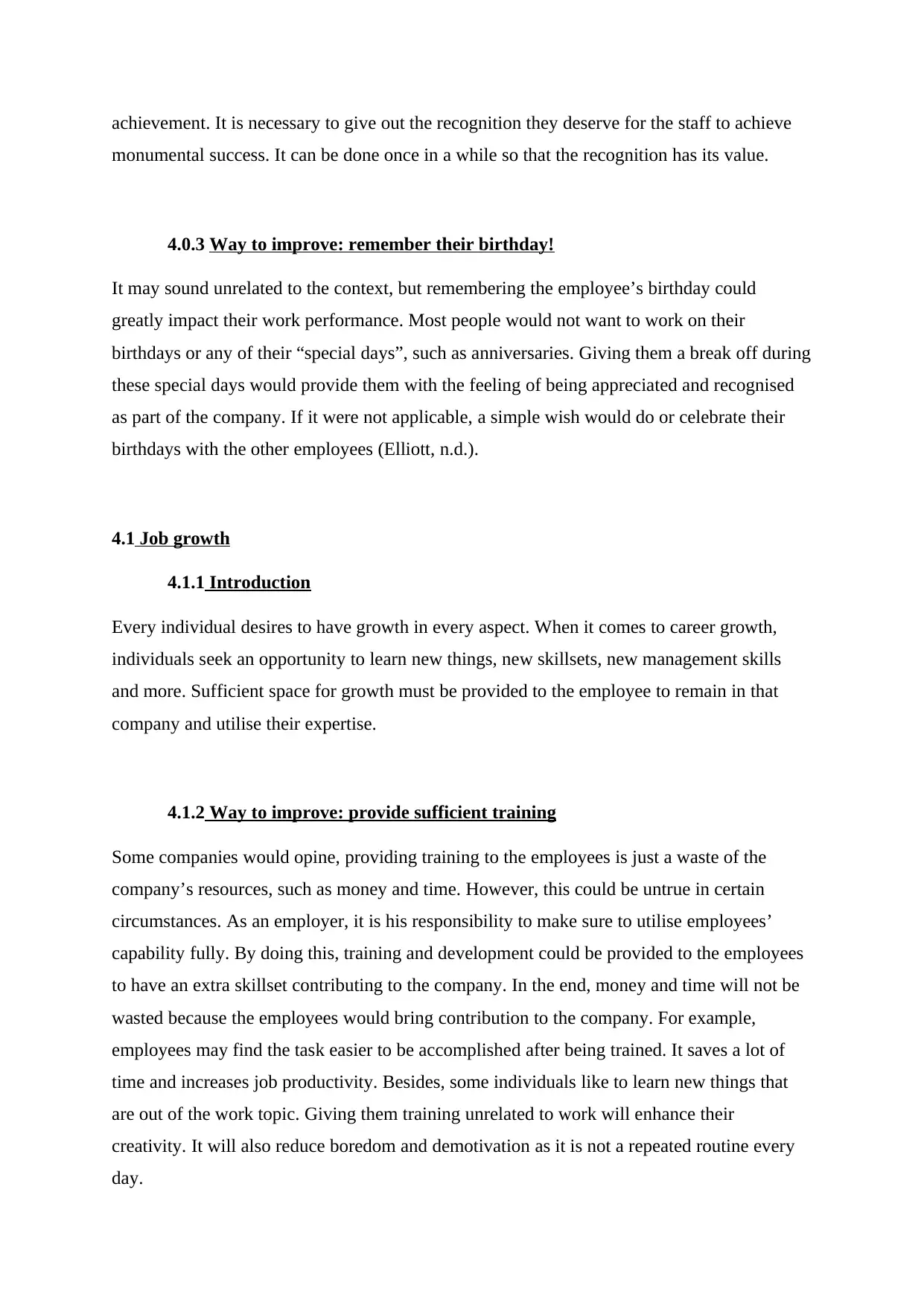
achievement. It is necessary to give out the recognition they deserve for the staff to achieve
monumental success. It can be done once in a while so that the recognition has its value.
4.0.3 Way to improve: remember their birthday!
It may sound unrelated to the context, but remembering the employee’s birthday could
greatly impact their work performance. Most people would not want to work on their
birthdays or any of their “special days”, such as anniversaries. Giving them a break off during
these special days would provide them with the feeling of being appreciated and recognised
as part of the company. If it were not applicable, a simple wish would do or celebrate their
birthdays with the other employees (Elliott, n.d.).
4.1 Job growth
4.1.1 Introduction
Every individual desires to have growth in every aspect. When it comes to career growth,
individuals seek an opportunity to learn new things, new skillsets, new management skills
and more. Sufficient space for growth must be provided to the employee to remain in that
company and utilise their expertise.
4.1.2 Way to improve: provide sufficient training
Some companies would opine, providing training to the employees is just a waste of the
company’s resources, such as money and time. However, this could be untrue in certain
circumstances. As an employer, it is his responsibility to make sure to utilise employees’
capability fully. By doing this, training and development could be provided to the employees
to have an extra skillset contributing to the company. In the end, money and time will not be
wasted because the employees would bring contribution to the company. For example,
employees may find the task easier to be accomplished after being trained. It saves a lot of
time and increases job productivity. Besides, some individuals like to learn new things that
are out of the work topic. Giving them training unrelated to work will enhance their
creativity. It will also reduce boredom and demotivation as it is not a repeated routine every
day.
monumental success. It can be done once in a while so that the recognition has its value.
4.0.3 Way to improve: remember their birthday!
It may sound unrelated to the context, but remembering the employee’s birthday could
greatly impact their work performance. Most people would not want to work on their
birthdays or any of their “special days”, such as anniversaries. Giving them a break off during
these special days would provide them with the feeling of being appreciated and recognised
as part of the company. If it were not applicable, a simple wish would do or celebrate their
birthdays with the other employees (Elliott, n.d.).
4.1 Job growth
4.1.1 Introduction
Every individual desires to have growth in every aspect. When it comes to career growth,
individuals seek an opportunity to learn new things, new skillsets, new management skills
and more. Sufficient space for growth must be provided to the employee to remain in that
company and utilise their expertise.
4.1.2 Way to improve: provide sufficient training
Some companies would opine, providing training to the employees is just a waste of the
company’s resources, such as money and time. However, this could be untrue in certain
circumstances. As an employer, it is his responsibility to make sure to utilise employees’
capability fully. By doing this, training and development could be provided to the employees
to have an extra skillset contributing to the company. In the end, money and time will not be
wasted because the employees would bring contribution to the company. For example,
employees may find the task easier to be accomplished after being trained. It saves a lot of
time and increases job productivity. Besides, some individuals like to learn new things that
are out of the work topic. Giving them training unrelated to work will enhance their
creativity. It will also reduce boredom and demotivation as it is not a repeated routine every
day.
⊘ This is a preview!⊘
Do you want full access?
Subscribe today to unlock all pages.

Trusted by 1+ million students worldwide
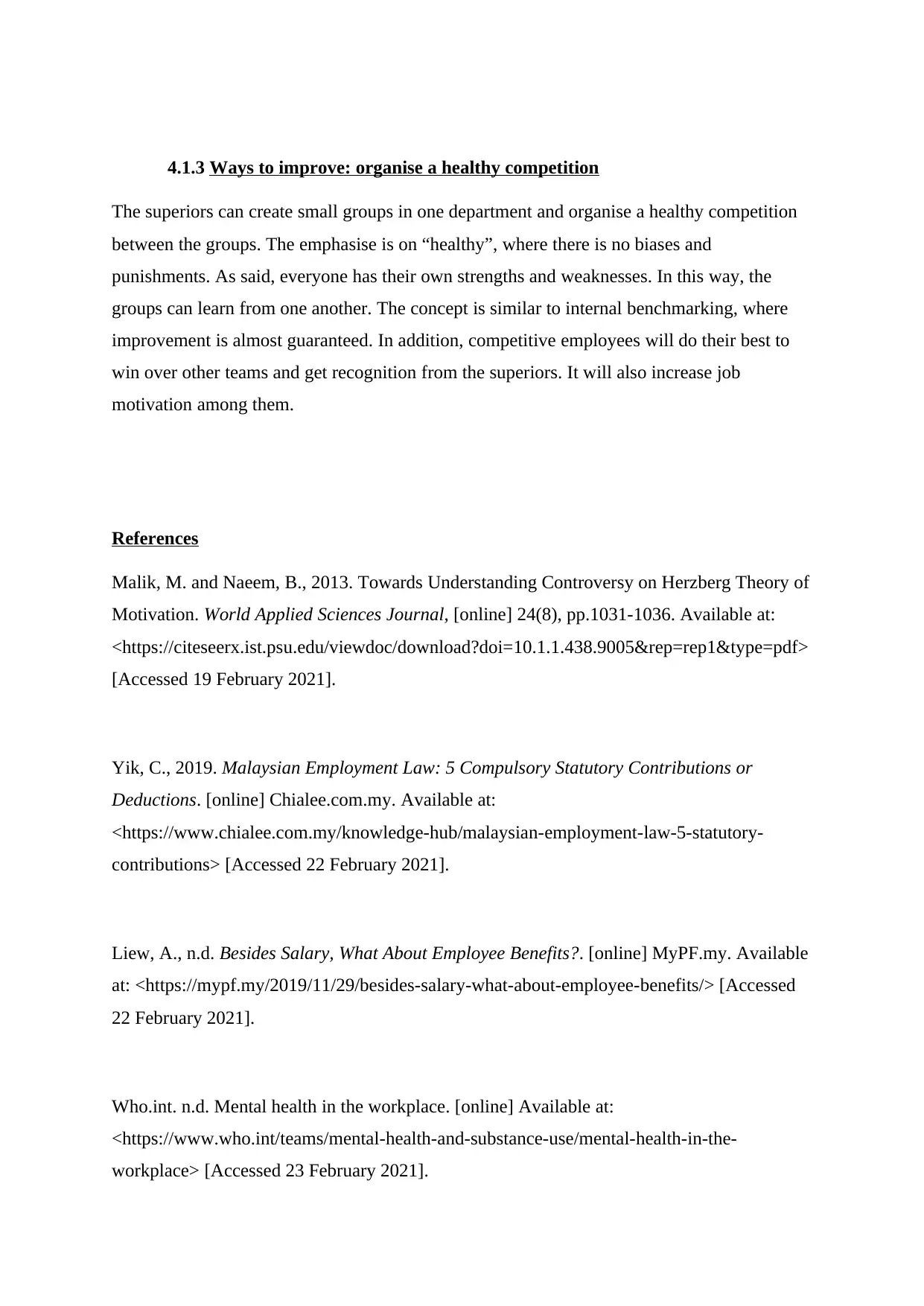
4.1.3 Ways to improve: organise a healthy competition
The superiors can create small groups in one department and organise a healthy competition
between the groups. The emphasise is on “healthy”, where there is no biases and
punishments. As said, everyone has their own strengths and weaknesses. In this way, the
groups can learn from one another. The concept is similar to internal benchmarking, where
improvement is almost guaranteed. In addition, competitive employees will do their best to
win over other teams and get recognition from the superiors. It will also increase job
motivation among them.
References
Malik, M. and Naeem, B., 2013. Towards Understanding Controversy on Herzberg Theory of
Motivation. World Applied Sciences Journal, [online] 24(8), pp.1031-1036. Available at:
<https://citeseerx.ist.psu.edu/viewdoc/download?doi=10.1.1.438.9005&rep=rep1&type=pdf>
[Accessed 19 February 2021].
Yik, C., 2019. Malaysian Employment Law: 5 Compulsory Statutory Contributions or
Deductions. [online] Chialee.com.my. Available at:
<https://www.chialee.com.my/knowledge-hub/malaysian-employment-law-5-statutory-
contributions> [Accessed 22 February 2021].
Liew, A., n.d. Besides Salary, What About Employee Benefits?. [online] MyPF.my. Available
at: <https://mypf.my/2019/11/29/besides-salary-what-about-employee-benefits/> [Accessed
22 February 2021].
Who.int. n.d. Mental health in the workplace. [online] Available at:
<https://www.who.int/teams/mental-health-and-substance-use/mental-health-in-the-
workplace> [Accessed 23 February 2021].
The superiors can create small groups in one department and organise a healthy competition
between the groups. The emphasise is on “healthy”, where there is no biases and
punishments. As said, everyone has their own strengths and weaknesses. In this way, the
groups can learn from one another. The concept is similar to internal benchmarking, where
improvement is almost guaranteed. In addition, competitive employees will do their best to
win over other teams and get recognition from the superiors. It will also increase job
motivation among them.
References
Malik, M. and Naeem, B., 2013. Towards Understanding Controversy on Herzberg Theory of
Motivation. World Applied Sciences Journal, [online] 24(8), pp.1031-1036. Available at:
<https://citeseerx.ist.psu.edu/viewdoc/download?doi=10.1.1.438.9005&rep=rep1&type=pdf>
[Accessed 19 February 2021].
Yik, C., 2019. Malaysian Employment Law: 5 Compulsory Statutory Contributions or
Deductions. [online] Chialee.com.my. Available at:
<https://www.chialee.com.my/knowledge-hub/malaysian-employment-law-5-statutory-
contributions> [Accessed 22 February 2021].
Liew, A., n.d. Besides Salary, What About Employee Benefits?. [online] MyPF.my. Available
at: <https://mypf.my/2019/11/29/besides-salary-what-about-employee-benefits/> [Accessed
22 February 2021].
Who.int. n.d. Mental health in the workplace. [online] Available at:
<https://www.who.int/teams/mental-health-and-substance-use/mental-health-in-the-
workplace> [Accessed 23 February 2021].
Paraphrase This Document
Need a fresh take? Get an instant paraphrase of this document with our AI Paraphraser

Elliott, W., n.d. The Importance of Employee Birthday Celebrations | Reward Gateway.
[online] Rewardgateway.com. Available at: <https://www.rewardgateway.com/blog/the-
importance-of-birthday-celebrations-and-employee-engagement> [Accessed 23 February
2021].
[online] Rewardgateway.com. Available at: <https://www.rewardgateway.com/blog/the-
importance-of-birthday-celebrations-and-employee-engagement> [Accessed 23 February
2021].
1 out of 11
Your All-in-One AI-Powered Toolkit for Academic Success.
+13062052269
info@desklib.com
Available 24*7 on WhatsApp / Email
![[object Object]](/_next/static/media/star-bottom.7253800d.svg)
Unlock your academic potential
Copyright © 2020–2026 A2Z Services. All Rights Reserved. Developed and managed by ZUCOL.


